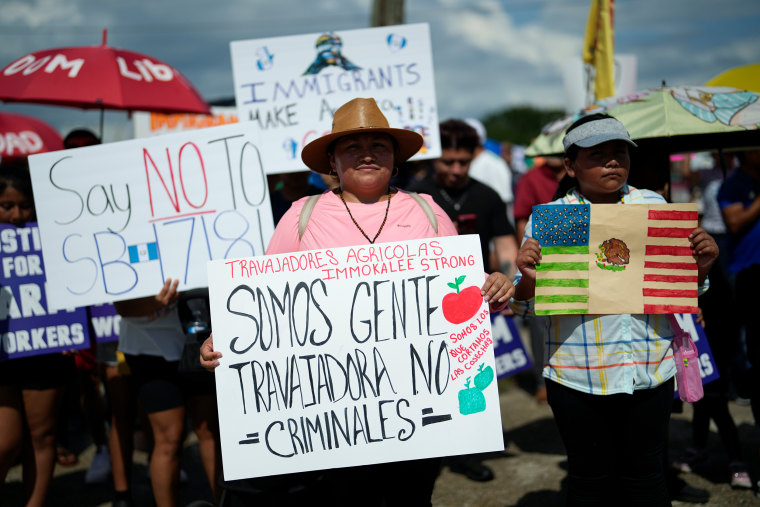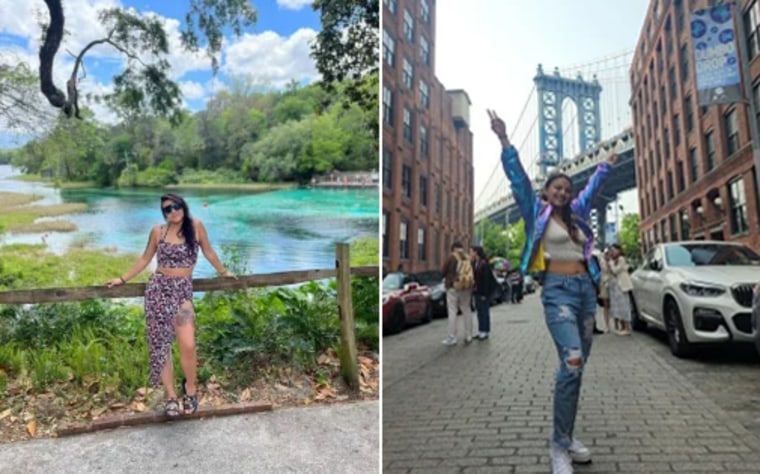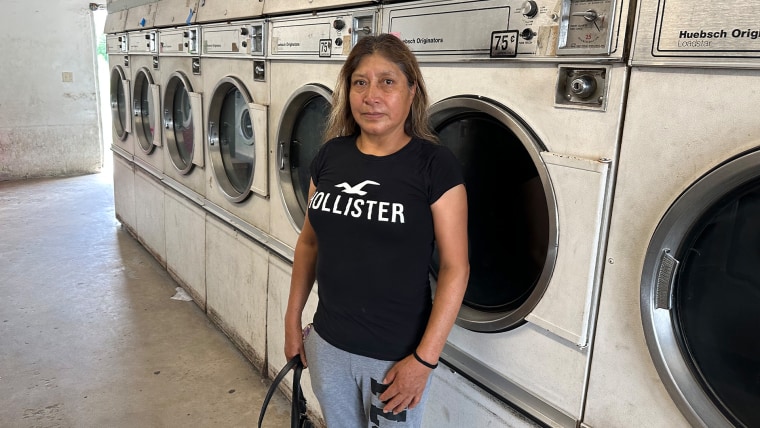[ad_1]
When David Guerra and his large family fled Florida in May, they left behind beds, mattresses, furniture and the construction tools they used to make a living. But it’s when he thinks of his children’s toys that his voice breaks.
“That is what has hurt me the most, my girls, who no longer have toys,” said Guerra, who is from El Salvador and who, until a few weeks ago, had a home, a yard and a business with his family in Tampa.

Their life as they knew it changed, according to Guerra, when Gov. Ron DeSantis, signed SB 1718, the immigration law that goes into effect on July 1. The law imposes strict restrictions and penalties to deter the employment of undocumented workers in the state.
Of the 10 people who lived in the Guerra house, only three children were U.S. citizens. The others didn’t have legal immigration status. They left Tampa on May 30, from the same street where, a month earlier, Guerra had seen the belongings left behind by other immigrants and joked in a popular TikTok video that he would be next.
“After a month, I had to leave,” Guerra told Noticias Telemundo from Maryland, where he moved with his family.
Guerra is not the only one. In various cities across the state, such as the farming community of Immokalee, many immigrants say they have at least one acquaintance, friend or neighbor who left after the law was passed. Some have posted of their exile on social networks.

“They don’t want us here”
Guerra, a construction worker, came to the U.S. more than 20 years ago. Together with his partner, his sister-in-law and his stepdaughter — who’s a beneficiary of the Deferred Action for Childhood Arrivals ( DACA) program — they worked polishing and putting the finishing touches on walls and ceilings in houses across the Tampa area.
Guerra has been in Tampa for six years, where he built a clientele and bought his tools. Leaving some of them behind when he left the state cost him more than $2,000 in losses, he said. In Maryland, neither he nor his family has been able to get a job.
“I was well, well, well situated in Florida. I was doing well financially, stable with work. There was no problem. Now it’s the opposite,” he said.
Some 2.7 million immigrants made up 26% of Florida’s labor force in 2018, according to a census analysis. More than 300,000 worked in the construction sector, like Guerra and his family.
Guerra said neighbors started to leave when the Legislature first introduced the immigration bill. By the time the Legislature voted on the law and DeSantis signed it, there were no workers on one of the projects he was working on.
“So the time came to make a decision: “I told my wife ‘no way, she’s going to have to go because they don’t want us here’”.
‘Leaving your life’
Guerra packed what he had into two trucks and a car. In Maryland they live with a relative and have settled in as best they can. His two daughters, age 3 and 8, have to sleep with the adults.
“There (in Florida) they had their little bed, in the shape of a house, their rooms and now, well imagine,” he said with sadness.
His young daughter asks to go home and cries for her toys, he said.
Nearly 100 miles from Tampa, where Guerra lived with his family, a 25-year-old undocumented immigrant rented an apartment with her boyfriend in the city of Ocala.
Maria Fernanda, whose last name has been withheld because of her immigration status, arrived with a visa four years ago from Colombia. The visa was for a temporary stay that was extended by the Covid-19 pandemic.
Florida was “one of my favorite states,” Maria Fernanda said, until she feared what could happen when the law took effect. Her boyfriend is also undocumented, and before DeSantis’ law was passed, they decided to leave for New York.

“I said, ‘I don’t want to go through that fear or that need to see a policeman that can deport me or that they can stop me or ask me for my documents,’” Maria Fernanda said.
They left without saying goodbye to their acquaintances and left their belongings behind, but not their cats, Loki and Alicia. She documented her journey in a series of videos that she shared on TikTok. Most of the commenters, she said, have thanked her for not abandoning her pets.
“Where I go, they go, and where I have a roof, they will have a roof,” she said.
Her boyfriend got a job in Delaware and she stayed in New York for work. The separation hurts; they must drive more than four hours to see each other and share the time with their cats.
“It is sad that couples, families are separated, that sometimes they abandon animals on the street because they cannot take them. They leave their things lying around, their houses abandoned,” she said. “That is sad because it’s leaving your life.”
Gauging the exodus
It’s difficult to know the number of immigrants who have left the state. Local communities and leaders base counts on what they hear by word of mouth: a neighbor who left his house, a worker who never came to work.
“This is happening at such a fast level that we don’t have a concrete number,” Rosa Elera, of the Florida Immigrant Coalition, told Noticias Telemundo.
The Florida Policy Institute has stated the legislation could cost Florida’s economy $12.6 billion in one year. Six industries, including construction, agriculture and services, employ an estimated 391,000 undocumented workers, or about 10% of workers in those sectors.
Elera said people are frightened and confused by the law.
Even though the law hasn’t yet taken effect, the Florida Immigration Coalition has already received complaints that some clinics have been asking patients about their immigration status, even though only hospitals that accept Medicaid are required to ask about immigration status, and patients may decline to answer the question, Elera said.
“Primary doctors or clinics or emergency centers that do not receive Medicaid do not have to be asking the immigration status of a patient,” she said.
Guerra said he believed the environment changed after the law was passed. “Many Americans didn’t even greet you anymore, they looked down on you, so to speak,” he said. “That was what most led me to make the decision to come to Maryland.”
Fear of leaving and returning
In Immokalee, Berta, an undocumented Guatemalan mother, picks tomatoes, chiles, squash and eggplants in the searing heat. About 40,000 farmworkers, many of them undocumented, work every season harvesting a variety of fruits and vegetables.
But for the first time in more than 18 years, Berta, 52, said she’s afraid of living in the U.S.
“We are used to working here without anyone scaring us,” she said. Now, “when I see police I am afraid that they will stop us, detain us and call the immigration authorities.”
Many of her acquaintances, she notes, have gone to Delaware, Maryland, Virginia and Washington.
When the harvest in Florida ends, Berta travels to other states to pick crops, but this year she wonders if she’ll be able to come back.

Not everyone who fears the law can flee the state. Rosa Bartolo, 22, is an asylum seeker. Although she obtained a work permit, her husband and 15 other family members who live in Florida are undocumented.
Although the Guatemalan family has thought of leaving, they’re staying because they know only farming and they speak only their Indigenous language, Akateko Maya.
Starting from scratch in another state for them “is more difficult because you don’t speak Spanish, you don’t speak English, it’s much more difficult. People see you badly, as a strange thing,” she said.
‘Like a rat’
When asked if he would return to Florida, Guerra said it’s not in his plans, because he feels “damaged.”
“It hurt, it hurt to have to throw everything out,” he said. “It’s a humiliation what they did, to take you out, like a rat.”
In Maryland, he said, people treat him differently, better. Seven years ago he got his driver’s license in that state and in Florida, when the legislation takes effect, an undocumented immigrant won’t be able to use a valid driver’s license. “Thank God here you can breathe peace and tranquility,” he said.
María Fernanda is not afraid in New York. “I don’t feel that anyone who sees me and sees me as a Latina is going to stop me and say: ‘Hey, show me your documents.’ Here, where I am, I don’t feel persecuted because of my race.”
Meanwhile, Guerra takes comfort in knowing that before he left Florida he could give away some of his family’s belongings to other immigrants in need. A young Cuban recently arrived in the country, he said, and took almost everything.
“’Thank God,’ (the young man) told me, ‘I was sleeping on the floor and look, now I have beds,’” Guerra said. “Starting from scratch is very sad.”
[ad_2]
Source link
